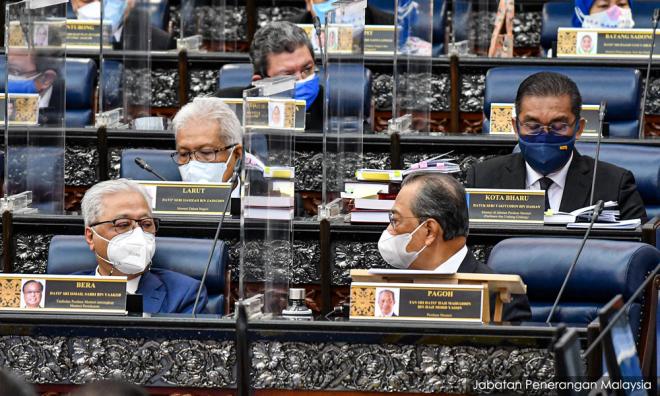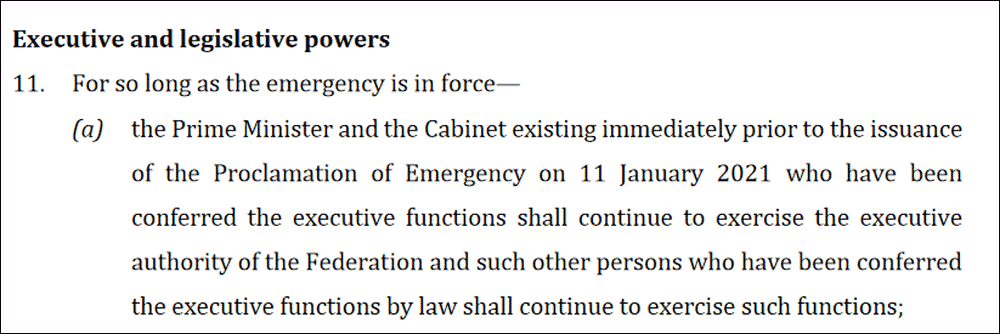By Annabelle Lee | Malaysiakini

Lawyer Mohamed Haniff Khatri opined that Perikatan Nasional committed a faux pas in revealing it has “revoked” all emergency ordinances in an alleged bid to avoid the matter being put to the vote.
In other words, he said PN removed itself from power.
Under the emergency, the Yang di-Pertuan Agong had given the administrative power vested in him to the government via Section 11 of the Emergency (Essential Powers) Ordinance 2021.
The ordinance stipulates that the prime minister and cabinet are to continue exercising executive powers during the emergency period.

With this important section gone, Haniff argued that Malaysia is effectively left with no government until Aug 1.
“The power to administer the nation during the emergency was vested by the Agong to the government under Muhyiddin Yassin pursuant to Section 11.
“When they say they have repealed or revoked (all ordinances) from July 21, this means Section 11 is gone.
“So, the constitutional crisis is — we do not have any institute who can administer the nation from July 21 to Aug 1,” he explained.

According to the Federal Constitution, Haniff said administrative powers during an emergency are returned to the Agong.
“The power goes back to the Agong. So, if within the next 10 minutes, the king appoints you or me to run the country, this is valid until Aug 1,” he told Malaysiakini.
Shocking announcement
De facto Law Minister Takiyuddin Hassan’s announcement on the revocation this morning shocked Dewan Rakyat.
He also said it was, therefore “no longer relevant” to vote to annul the ordinances.
Without having to vote on the emergency ordinances, PN saved itself from a defeat since many of its members were absent from the House.
However, Haniff argued that the plan had backfired.
“You are the one holding power, you are saying ‘we have revoked it’. That means you are saying there is nobody running the country from now until Aug 1.
“The party which carried out the process — which is wrong — they themselves have committed suicide,” he added.
Did minister ‘mislead’ Dewan Rakyat?
Haniff, who often represents Parti Pejuang Tanah Air (Pejuang) chairperson Dr Mahathir Mohamad, was one of several lawyers who questioned the revocation process.
Both Haniff and lawyer New Sin Yew opined that emergency ordinances can only be revoked in one of two ways: Either the Agong revokes it and a Gazette is published or both Parliament houses vote to annul it.
Despite Takiyuddin’s announcement, there is no record of the revocation Gazette on the Attorney General’s Chambers website.
The July 21 date suggests that the revocation was done during last Wednesday’s cabinet meeting. The prime minister usually has an audience with the Agong before such meetings.

In the absence of a Gazette on the matter, New questioned if the revocation was valid and if Takiyuddin “misled” the Dewan Rakyat with his announcement.
“Any revocation must be signed by the Agong. It was the Agong who promulgated it so it should be him that revokes it. Cabinet cannot act unilaterally and bypass the king.
“If he had revoked it, then it needs to be published in the Gazette for it to take effect. It will only take effect and come into operation from the date of the publication in the Gazette.
“Until these are done, it cannot be said that there has been revocation,” he said.
Lawyer Malik Imtiaz Sarwar similarly questioned in a tweet if the “revocation” was legitimate.
Case law interprets A150(3) as requiring either an express revocation by YDPA or a resolution of both houses. This applies equally to Proclamation and Ordinances. So, in the absence of either I do not think it can be said that either has been revoked/lapsed
— Malik Imtiaz Sarwar (@malikimtiaz) July 26, 2021
DAP-linked lawyer Syahredzan Johan further questioned the reason for the government waiting six days to inform the public about this.
“In that period, how many people have been compounded, arrested, had items seized and publications taken down based on laws that the government claims it has ‘revoked’?
“Will the government pay compensation to those who have been implicated under these cancelled emergency ordinances?” he asked in a Facebook post.
“The rakyat have the right to know if there are any changes in the law through Gazettes or at least an announcement.
“This is not like sending a message in a WhatsApp group and asking people to forward it. These laws affect 32 million Malaysians,” he added.



